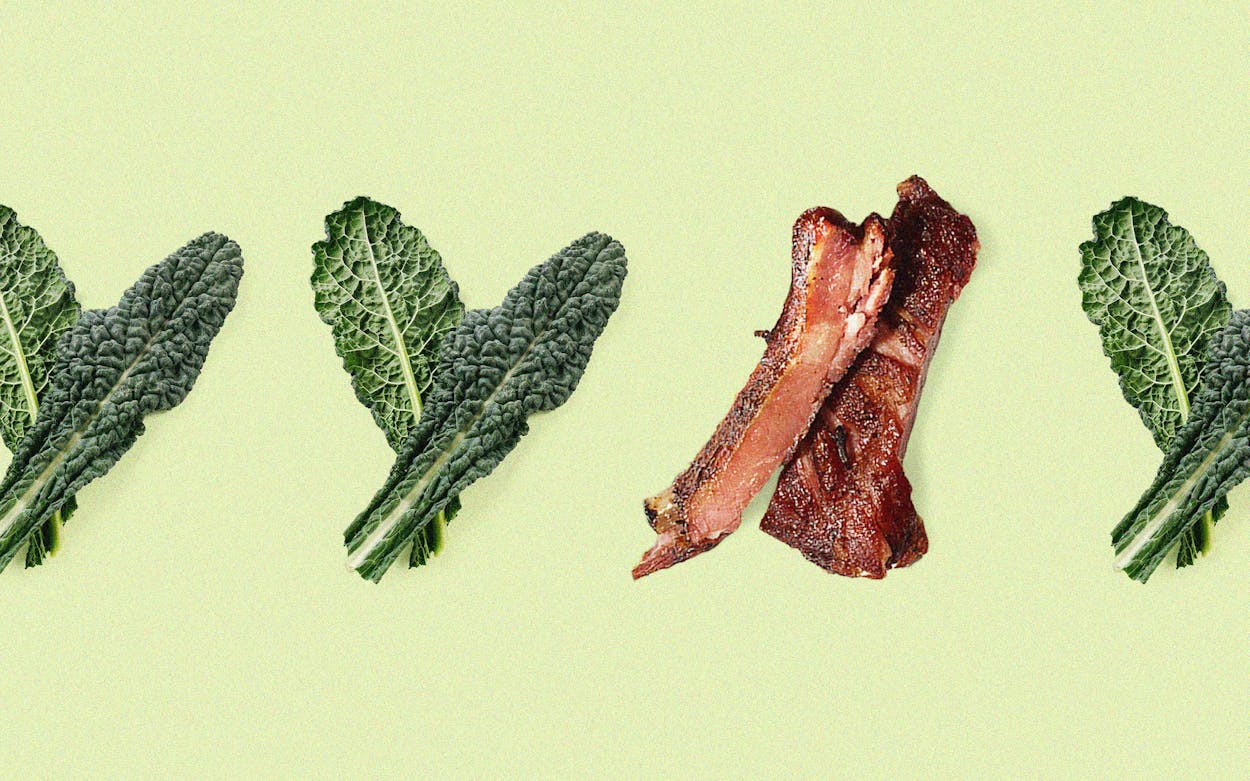I had a carnivorous upbringing full of hot dogs and Happy Meals. Until I was thirty, I held fast to a perception of vegetarians as self-righteous dorks.
Then, about a year ago, for reasons climatological (cows hotboxing the planet with their greenhouse expulsions) and aesthetic (this supple bod), I veered veg myself. The experience has vindicated me: I have seen firsthand that the relationship between vegetarianism and self-righteousness is, as I always suspected, linear. I am now 90 percent vegetarian and 90 percent insufferable about it.
I almost went all the way. Last spring, when Texas Monthly deployed a team of 35 diners to visit 411 barbecue joints across Texas in service of the Top 50 list, I had been bragging for a few months about being “basically vegetarian.” I discovered some tolerable plant-centric recipes, lost five pounds, and was leading a pure life in general. But when the call came to eat heaps of barbecue—as a public service, no less—I swan-dived off the lentil wagon. Over three days I went to eleven barbecue joints. It was The Lost Weekend, the iconic image of shot-glass rings on a wooden bar replaced by piles of crumpled, sauce-stained napkins.
Driving out of Dallas after my last stop, fingers swollen around the wheel from surplus sodium, it occurred to me that as long as the brisket at Slow Bone is available I will never be a gold-star vegetarian. But I’ll be the best Texatarian I can be.
Texatarians are legion, but reveal themselves only over time. Your vegan-by-marriage friend steals a rib from your barbecue platter and does not break eye contact with you as she eats it, daring you to say something. (You do not.) Your pescatarian boyfriend allows that he does, occasionally, eat barbecue. Your gentle, mostly herbivorous colleague kills a turkey in cold blood.
Texatarianism is a more noble subset of “flexitarianism.” Where the common flexitarian follows a plant-based diet except for occasional indiscriminate trysts with fish or meat, the Texatarian makes exceptions for meats that feel especially Texan. Her definition of “Texan” may change from day to day and is between her and her god. For me, it is barbecue, tacos, or meat that is being served to me by someone who seems like they’d take offense if I did not eat it.
And while the flexitarian is wanton in the meat she chooses to consume, the Texatarian treats meat as a rite, to be anticipated, respected, and selected carefully.
“I definitely appreciate it more,” said Jesse Litvin, who lives in Austin and is mostly vegetarian. “If you’re eating something every day, you’re not going to notice things you would have noticed otherwise with taste and flavor, and maybe the differences in how that dish tastes somewhere else.”
Litvin was entirely vegetarian until age seven, when he encountered bacon at a hotel breakfast buffet in Washington, D.C. It was Eve and the apple: Litvin ate meat frequently for the next fifteen years. When he was in college, Litvin returned to vegetarianism because of sustainability concerns, but now he gleefully errs.
He never buys meat to eat at home, and at most restaurants he does typically order a vegetarian dish. “But if I’m going to the Salt Lick, or to a really good taco truck,” Litvin explained, “it feels like the right thing to do is to try the meat option there.” (God bless he who walks into the Salt Lick asking for the vegetarian option.)
He pointed out that most cities these days are vegetarian-friendly. It’s pretty easy to participate in the world while maintaining a plant-based diet—even in Dallas. But Texas, he said, just has so many more meat-based signature dishes than other places. To eat meat here is to connect with the culture.
“It reminds me of who I am, and it reminds me of who we are in connection to each other,” said Jenny Carlson, who also lives in Austin. Along with her partner, Carlson eats a primarily pescatarian diet. “And I also have that with produce, but with meat, because it’s a life—and because of all the lives that go into creating that animal—it’s a moment of connection.”
Carlson, an anthropologist specializing in environmental politics, became a vegetarian twenty years ago, after she read Diet for a New America by John Robbins in college. Carlson is from Elgin, where her father still raises cows. He sells them in Lexington—home of Snow’s BBQ. Thus, Carlson eats the brisket at Snow’s. “That’s where our meat is,” she said. “And we’re from Elgin, so we eat Southside barbecue. Because that’s where we’re from.”
Carlson was motivated to stop eating meat largely because of concerns about the consequences of mass agriculture, for the environment, the animals, and the workers involved. But years ago, when she was home after a long interlude of fieldwork in Germany, Carlson went to a Rudy’s Country Store and Bar-B-Q with a group of friends. As she sipped an orange soda, she asked herself whether refraining from enjoying barbecue with her friends would really right all the wrongs of industrial agriculture. She got some barbecue. (Carlson acknowledged that Rudy’s is no Snow’s, “but it was still delicious to someone who has been in the meat desert for years.”)
Now Carlson and her partner will eat animals her father killed, or meat they know has been otherwise sustainably sourced. They eat it only outside of their home, and only on special occasions. And when Carlson does dig into some brisket, she is acutely aware of the work and resources involved in her meal. “It’s a very environmentally intensive food, and that doesn’t mean that it’s bad to eat meat,” she said. “What it means is a lot goes into it.”
I liked Carlson’s thoughtful Texatarianism because it celebrates rather than vilifies meat. The occasional brisket hit doesn’t mean you’re a failure—as long as you appreciate its grand cost, waste none of it, and enjoy it.
I have endless respect for the no-Texceptions vegetarians in my life. They have the fortitude to sit happily with a side of coleslaw and a piece of corn bread while, across the table, I eat a pile of pork ribs with erotic intensity. They are so at peace with themselves that they can march through several nopales tacos while I sample every meat-based option on the menu. I still aspire to that calm commitment to one’s values even in the face of extraordinary offerings.
But for now I am content to marinate in the tantalizing promise of Texatarianism: I can have my brisket, and my self-righteousness too.








